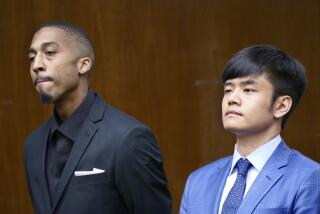Jury Awards $700,000 to Family in HMO Trial : Lawsuit: Husband and son of Joyce Ching win negligence case against two Simi Valley doctors. The eventual diagnosis was colon cancer.
- Share via
The husband and son of cancer victim Joyce Ching were awarded more than $700,000 Wednesday when a Ventura County jury ruled that her Simi Valley doctors’ negligence led to her death last year at age 35.
The jury decided that Dave Ching, 37, and 5-year-old son Justin should receive nearly $3 million because doctors Elvin Gaines and Dan Engeberg did not detect Joyce Ching’s cancer in time to save her life. But a state law passed 20 years ago limits the damages that can be collected in medical malpractice cases.
The jurors were unanimous in deciding that Gaines was negligent and that his poor treatment of Ching led to her death. The eight-man, four-woman panel was split 9 to 3 on the culpability of Engeberg, who did not treat Ching as often as Gaines did.
“The message the jury sent is in the number” of $3 million, said Mark Hiepler, lawyer for the Ching family.
The case had originally challenged the health maintenance organization system of paying affiliated physicians and alleged that the two doctors’ negligence was motivated in part by greed. But Superior Court Judge Ken W. Riley ruled that Hiepler did not prove that point and tossed the accusation out of court two days before the jury began deliberations.
Still, Hiepler claimed Wednesday that the verdict was an indictment of the managed health care industry.
“This sends a clear message that when you mix incentives and money with medicine, it equals death,” Hiepler said. His clients argued that Gaines and Engeberg delayed sending the ailing Joyce Ching to a stomach specialist until it was too late because they feared it would cut into the profits of their medical practice.
The Chings, who lived in Simi Valley at the time, belonged to the MetLife health maintenance organization, which required its doctors to spend $5,000 of their own money on outside referrals for each patient before the insurance giant would begin reimbursements.
But defense attorney Michael Gonzalez has consistently denied that greed played a part in Ching’s treatment nor did he concede that it was a viable legal argument under any circumstance.
“This sends no message to the medical community,” Gonzalez said after the verdict was read. He said he does not believe the managed care system is rife with the financial abuses Hiepler claimed and that the “integrity of the profession” would prevent most abuses.
He also said that his clients, who were not in court Wednesday, were disappointed with the verdict and still maintain that they did everything professionally possible to treat Joyce Ching.
Further, he said he believes that Hiepler’s argument unduly influenced the jury in reaching its decision and probably led to some confusion during deliberations. Though the doctors’ contract with MetLife was discussed, Riley never specifically told the jury that the greed allegation had been dismissed.
Bailiffs ushered jurors down a private stairwell to exit the courthouse and none were available for comment.
But Hiepler said the accusation that greed leads to medical negligence is a viable legal argument and he expects to see similar suits in the future. “Joyce Ching did not die in vain,” he said.
A pleased Dave Ching said the verdict sends a message to patients to “don’t take your family doctor for granted, do some research, ask questions and be diligent in your own medical research.”
For three months in 1992, Joyce Ching visited Gaines and Engeberg complaining of stomach pain and other discomfort. For three months, the two doctors did not check for cancer and instead pursued other diagnoses, testimony showed.
Only after Ching’s husband confronted Gaines and refused to leave his office until he received a referral to a gastroenterologist--a specialist in treating stomach disorders--was her colon cancer found.
Both attorneys declined to say if they would appeal any part of the verdict or of Riley’s ruling.
“Whether I was right or I was wrong will be decided by the Court of Appeal or even the Supreme Court,” Riley told the jury after it had delivered its verdict.
More to Read
Sign up for Essential California
The most important California stories and recommendations in your inbox every morning.
You may occasionally receive promotional content from the Los Angeles Times.










